Our Monks
Consecrated Lives
Our monks have graduate degrees in chemistry, theology, philosophy, history, English and meteorology. Many of them had successful careers as businessmen and educators; several served on active duty in various branches of the Armed Forces. What eventually drew them to the monastic life and Belmont Abbey Monastery in particular? They’ll tell you in their own words.
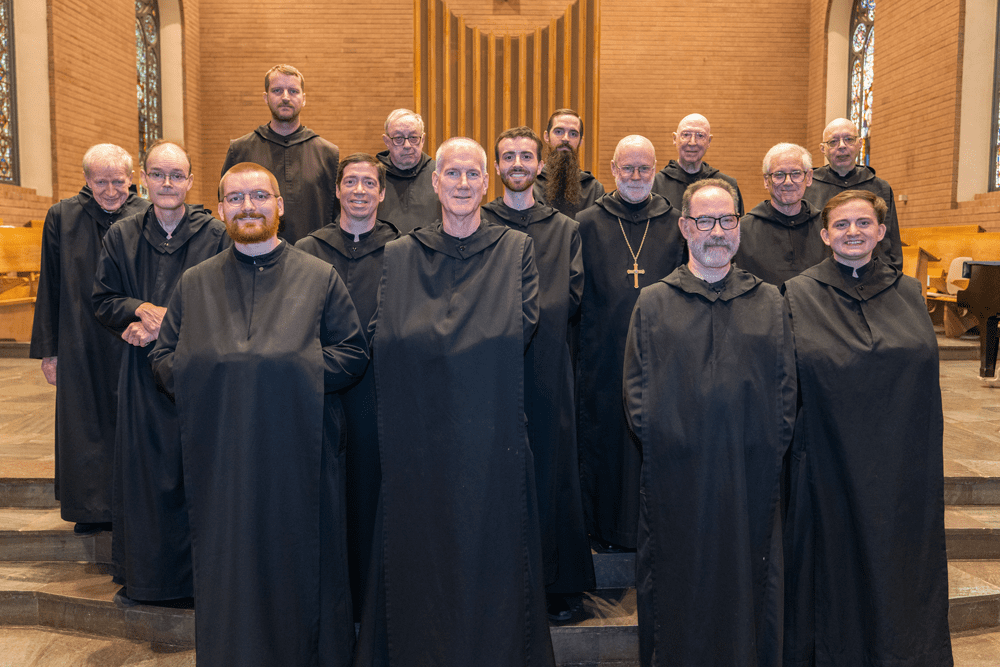
X
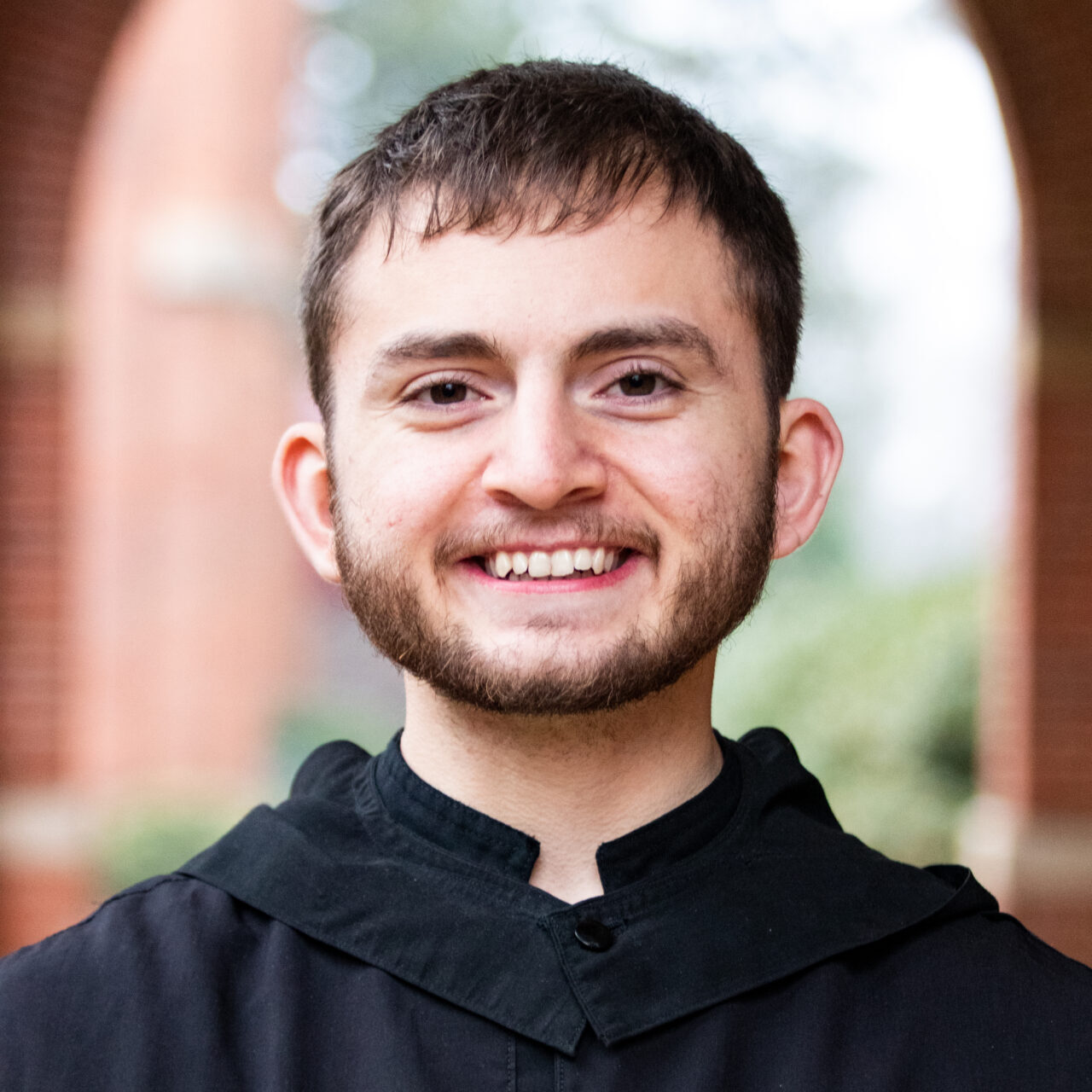
BROTHER CHRYSOSTOM
I experienced a twofold draw to the monastic community at Belmont. First, there was the experience of praying the Liturgy of the Hours. Second, the example of the veterans of the community attracted me and continues to sustain my discernment today. I attended the Office more on less on a whim, and was struck by the intentionality, the silence, and the simplicity of it all. But most of all, I was struck by how the Psalms expressed deep emotions, desires, and fears that I had experienced in ways that were new to me and gave me a vocabulary which enabled me to understand myself and my experiences, and to speak about them to God. I still believe the Liturgy of the Hours is what taught me to pray; it made me realize that God speaks and can be heard and listens and does respond. My vocation story is simply that I wanted more of that experience of God, and so I started attending the Liturgy of the Hours more often; now I attend it all the time. I realized that listening to my heart meant seeking his face (cf. Ps. 27:10).
I also developed relationships with some of the older monks as confessors and teachers in the college. I was impressed by their down-to-earth attitude, devoid of any ostentatiousness, but still grounded on a real lived faith in God. Their example, advice, and support have sustained me, and I see myself as following in their footsteps. Rather than finding a path for myself, I am being led by men whom I have a deep respect for, and whom I desire to emulate. I’ve realized that I have much in common with them, and with all the people who have prayed the same Psalms over the past several thousand years. The reason I am here is because of them, and because this place is where I heard the voice of God and discovered that I could respond.
X
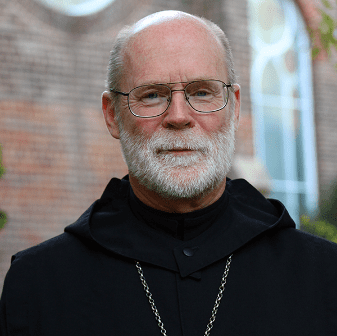
ABBOT PLACID
One might think that I was almost destined to end up at Belmont Abbey. My oldest brother was a monk in our community, so I was visiting the abbey already as a child. My home parish, Saint Benedict’s, was, at the time, a dependent house of Belmont and was staffed by the monks, as was my high school. In elementary school, I was taught by the Benedictine Sisters from St. Benedict’s Monastery in Bristow, VA, which was originally founded by Belmont Abbey and subsequently given over to the sisters. I was surrounded by Benedictines from the beginning!
However, three things in particular stand out as significant sign posts along my path of discernment. The first is that, when visiting the abbey to see my older brother, my family would attend Vespers, the church’s evening prayer, with the monks. I remember, even as a young boy, being overwhelmed with a sense of profound peace during that time of prayer. I did not know why I felt that way, but the feeling of peace was powerful. Second, the monks impressed me as very talented men who were doing a good work, and were happy with their life. That was very attractive to me, and I wanted to be a part of that good work. Finally, I have always wanted to be a teacher. By the time I reached college, that desire had solidified into a wish to teach on the college level, and Belmont Abbey founded and sponsors Belmont Abbey College. Ironically enough – and it is probably evidence of God’s sense of humor – I have taught in the college full-time only a few of the years I have been in the monastery. I always seemed to get other assignments which took me away from the teaching which I do love. It has been a good lesson that, although prudent planning is important in making decisions in life, one has to be open to the unexpected and unanticipated developments that, in the end, will determine the reality of one’s life.
Finally, as I came to a resolution of a discernment to religious life, the unique characteristics of Benedictine life attracted me. The foundations of the spiritual life in the monastery are the very foundations of Christian life – the Bible and the church’s liturgy. The characteristic Benedictine vow of stability, whereby the monk commits himself to his community and its life, prayer and work for a lifetime, was appealing to me. I am the youngest of six children in a close family, and I knew that, if I was going to lead a happy and healthy life of celibate chastity, I needed the support of a community. Finally, I can see that I am continuing to benefit from the disciplines of monastic life, which open space in one’s life for the possibility of seeking God, which, according to St. Benedict, is the primary sign that one is called to the monastic life.
X
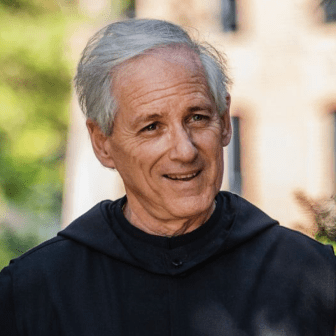
FATHER CHRISTOPHER
I was born and raised in New Albany, Indiana. I have five siblings, and we were all educated in our parish school. The church was an important part of my childhood, and it is fair to say that our lives revolved around our parish, Our Lady of Perpetual Help.
I am not sure when I began considering a vocation to the priesthood, although I am sure that the thought was there much longer than I would admit at the time. Upon graduation from high school I enrolled in St. Meinrad College, a college seminary operated by the monks of St. Meinrad Archabbey. I was officially a student for the Archdiocese of Indianapolis, and during the summers of my college years I would live and work in parishes throughout the archdiocese. I truly loved my summer experiences, and with the help of my spiritual counselor continued my studies for the diocesan priesthood.
During my college years I was profoundly influenced by the monks of St. Meinrad, and especially one of them. I admired the discipline of their lives and their selfless concern for their students. I was also very close to several priests of the Archdiocese who encouraged me in my discernment. At that same time, there were a couple of young monks from Belmont Abbey studying for the priesthood at St. Meinrad. My family had just moved to North Carolina, and they were so enthusiastic about their monastic community that I accepted their invitation to visit Belmont. I found the community warm and inviting, and their work impressive, but I had such good experiences in my summer assignments that I decided that after college I would continue to study for the priesthood as a student for the Archdiocese.
It is funny how things don’t work out the way you think they will. I began to think and pray about my interest in the monastic life. Something told me that I could not dismiss my interest so quickly. And so I visited Belmont again; there were no lightning bolts, no sudden clarity of thought, just a feeling that this was where I needed to be.
But perhaps more important than what brought me to Belmont Abbey is what has kept me here for almost 40 years. And that is a far easier question to answer. The community I entered in 1975 had amazing and heroic men, who built the community and the college with hard work and harder prayer, with much sacrifice and dedication. And they were eager to share their life and the treasure of their community with men who wanted to carry on the vision of St. Benedict as lived at Belmont. I fell in love with the enthusiasm and passion for the monastic life I found here. The enthusiasm and passion are still here so many years later, and we still eagerly share our life and treasure with men who wish to carry on the vision of St. Benedict. That’s why I came, and that is why I stay.
X
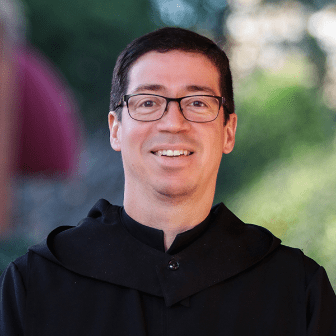
FATHER ELIAS
At some point in everyone’s life there should come a point of self-appraisal, where we ask the questions of meaning and purpose. What do I want out of life? What am I really looking for? For me this moment came one summer, around nine years ago. Although at the time I liked my job well enough, and in fact I had a very good job and good coworkers, I realized that I did not find it very fulfilling. I recognized then that I was looking for something more meaningful out of life. There awakened in me an attraction for living a life consecrated to God, and I recognized that I had had this desire at various times during my life, but had allowed other activities and self-doubt to distract me from it. However, in this time of self-appraisal, I came to believe firmly that ultimate fulfillment and happiness can only be found in union with God, and therefore I needed to order my life to seek God. In contrast, I also believed that what the world had to offer apart from God was just empty pleasure, which tended more toward enslavement than anything else. Moreover, I believed that the primary way for me to help other people was by deepening my holiness, a result of the transformation effected in my life by God when I am fully open to God, seek God with my whole heart, and generously give to God all that I have. When this is true, I will be an extension of God, instead of just working by human means; all of my actions will have more effectiveness than years of toil without personal holiness. It is from this foundation, that knowledge I share with other people, words I speak to them, or actions I do on their behalf will be most efficacious.
But there are many ways of life that would match what I have written. How did I find my way to life as a Benedictine monk at Belmont Abbey? For me, it was the result of pursuing a process of discernment involving regular prayer, spiritual direction, and frequent reception of the sacraments. Also very important was making several visits. It is not for nothing that Christ tells his disciples, “Come and see.” There is an insight gained from an actual visit that does not seem to be obtainable in other ways. It was through this whole process that I felt emotionally drawn to Belmont Abbey, excited and enthusiastic about the possibility. As I see it, what distinguishes the monastic life from other choices is the decision to give highest priority to regular prayer and scripture reading, both communal and private, while living with and working with a particular community of men in one place, who share the same commitment. The particular members of a monastic community and its location are thus quite important objects of discernment as well. A vocation to the monastic life is to a specific community and a specific location, another reason why visits are important. Over time, I have been blessed with a growing respect for the spirit and strength of my confreres at Belmont Abbey. As the psalmist says, how good and how pleasant it is, when brethren dwell in unity. For there the Lord gives his blessing, life forever.
X
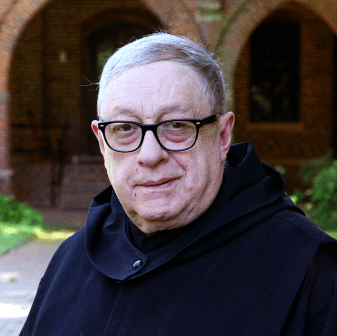
BROTHER PAUL
I came to Belmont Abbey College in the Fall of 1971 and one of my earlier memories was of the monk’s walking the Abbey Lane at midday and sometimes at night. Fr Matthew and Brs. Eugene and Frederick were walking after supper one evening and I caught up with them and fell in step with them. We finished the walk by the Cathedral and Matthew invited me to attend Vespers. I did and I had never felt such peace before and I still find solace and peace in the Vesper prayer of the monks.
The years have passed in the blink of an eye and there have been many changes here at the Abbey: leadership changes, deaths in the community, struggles with the daily routine not to mention renovations and natural disasters like Hurricane Hugo and Covid 19; but through it all the one constant that has remained is the church and the quiet it lends to prayer.
I take away from solitude and the grandeur of the Basilica the admonition “Be Not Afraid–I am with you always”
X
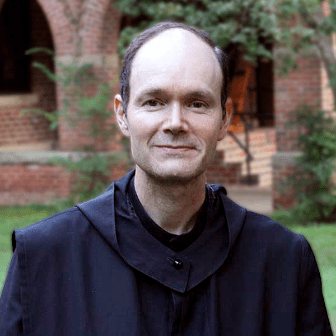
BROTHER EDWARD
My journey towards the monastic life began when I was at St. Bonaventure University. I loved to spend most of my time sitting in the chapel with the blessed sacrament. When I was not in class or with friends, I found myself in front of the Eucharist. After my time at St. Bonaventure, I spent a couple of years working internships. Finally, I landed a full time job with an advertising agency. Around this same time, I paid a visit to St. Paul’s Abbey in Newton, New Jersey.
When I first drove onto the grounds of St. Paul’s, I had a mini explosion of peace in my heart. At that moment I knew I was going to be a monk. The calling in my heart towards the monastic life never changed since that day. I was a steady vocation guest at St. Paul’s right up until the time I entered Belmont Abbey. My uncle once told me that he had never met anyone, like myself, who walked on the grounds of an abbey and instantly knew that he wanted to be a monk. St. Paul’s had been reduced to so few monks that I knew God was leading me to look at other monasteries.
I first visited Mount Savior Priory. It too turned out to have too small of a community. Next, I visited St. Vincent’s (Belmont Abbey’s mother house). It turned out to have too large of a community for me. Finally, I visited Belmont for two years. One day I was having a cup of coffee with the monks and I knew this was the place for me. The simple coffee gathering after lunch enabled me to find the meaning of St. Benedict’s statement in the Rule, “Welcome all as Christ.” For during this common coffee break, the monks at Belmont treated me as if I were already part of the community and one of their brothers. Because of this I knew I could live here for the rest of my days. I have been a monk at Belmont Abbey now for seventeen years. I now call Belmont Abbey a place of peace and my home.
X
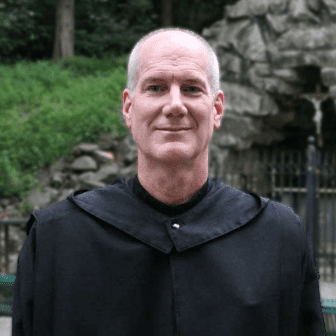
BROTHER TOBIAH
I am originally from Greenville, SC, and after high school spent 4 years in the U.S. Coast Guard. I grew up in the Baptist faith but when I was about 30 years old I began wondering why there were different Protestant denominations. I started doing a bit of research and after a while I joined a Lutheran church and attended there for about 6 years. Somewhere along the way I found myself going through a RCIA program and began learning more about Catholicism. After a 2nd RCIA program I joined the church in 2002. In a few years I became interested in a possible vocation within the Church and began discerning the monastic life. I had visited a couple of monasteries in the past and later came across Belmont Abbey’s website. The place looked interesting enough so I made a few visits and became acquainted with the monks and the life. After having spent some time in the military I found the disciplined life of the monastery appealing and it seemed to be the right place to spend my life working for the Lord (Labora) while seeking a deeper relationship with Him (Ora). I eventually made simple vows in 2008 and solemn vows in 2012.
X
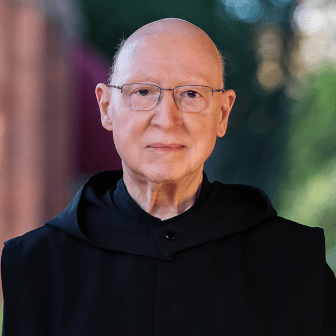
FATHER DAVID BROWN
I was born in 1946 in Mooresville, a town north of Charlotte. I went to public schools in Mooresville, and after graduating, attended Appalachian State University, where I earned a Bachelor of Science degree in French. It was at Appalachian that I first began to think about a monastic vocation. After I graduated from college, I taught French in the Charlotte-Mecklenburg school system for two years, and then applied to and was admitted to Belmont Abbey. After my theological studies, I was ordained, and began teaching in Belmont Abbey College. For the first few years, I taught theology, primarily Scripture, and then branched out into other areas, teaching at one time or another French, computer programming, and speech. My last assignment in the College was as registrar, a position I held for almost ten years. I have also worked in the monastery’s business office, which is my current assignment. In addition, I am working to complete the books for the community’s Liturgy of the Hours (the Divine Office). For relaxation, I like reading (mostly non-fiction), and puzzles of almost any kind.
X
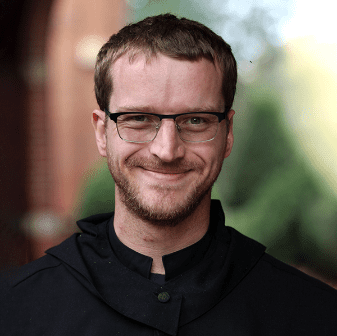
FATHER JAMES
Society is really bad at helping people become happy. I tried doing what the culture said would make me happy but nothing worked. I’d been raised as a Catholic in a Christian household and therefore knew happiness was possible. But I learned it just isn’t possible living a Post-Christian life. I decided I would put my trust in God to make me happy instead of the world and eventually found myself at Belmont Abbey. I, still to this day, do not know why God has asked me to be a monk, only that He has. Yet, even with this lack of knowledge, I am certain that I have found happiness and continue to live a happy life where I can have an impact on the happiness of others. Life is good here in a way that the society could never have prepared me for or hoped to instill in any adherent.
X
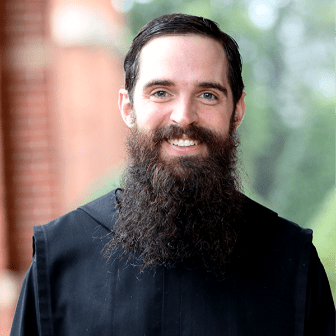
BROTHER LEO
I was born and raised in Winston Salem, North Carolina, the third of six children to my devoutly Catholic parents. Despite growing up in close proximity to Belmont Abbey, I knew very little about monks as a child. My first significant encounter with monastic life came when I was about 19 years old via a documentary film on the reclusive Carthusian order. I was immediately drawn in to the rhythm of prayer, work, and silence presented in the documentary. But I did not immediately consider a calling, instead enrolling at a small private college in Florida and focusing my energy on my studies. When I transferred to Belmont Abbey College my junior year, I quickly got to know Abbot Placid, who became a sort of mentor to me. I actually met him a few times when I was a child and he knew my parents, but I had not really known him until I enrolled at the college. He was a good listener and very affirming and encouraging, and I was grateful to have his support. Despite all this, I never considered a vocation to the monastery until after I graduated!
One day about 18 months after I graduated, I stopped by the monastery to visit the Abbot. At one point during my visit, I was struck by a sudden sense that I was exactly where I was supposed to be. I couldn’t say exactly what that meant, but I couldn’t shake the feeling off. Soon afterward a diocesan priest friend of mine joined the community as a postulant, and called me on the phone to encourage me to make an extended visit to the monastery, which I had never done. I visited, and then visited again, and then several more times over the course of the next year. The monastery quickly felt like home, and more than home; when I visited the monastery, it seemed that I was more myself than I had ever been anywhere else. The quietness of the hallways, the rhythm of work and prayer, and the community life seemed to envelop me so naturally and it felt so right, as if I was a long lost puzzle piece finally put in its proper place. I worked in Winston Salem and then in northern Virginia for a couple of years to pay down student loan debt before entering the community in March of 2018 as a postulant.
Living in the monastery has afforded me an invaluable opportunity to grow in my relationship with Jesus Christ, to learn more about His Church and the Sacred Scriptures, and to more deeply understand and empathize with myself and others. We are steeped in the Scriptures, praying the Liturgy of the Hours five times daily in community, as well as a daily hour lectio divina (the sacred reading of Scripture) privately. Trading the many amusements and distractions that used to occupy my time for precious silence with the Word of God is one of the best decisions I’ve ever made (OK, probably the best)! We are also blessed to have constant access to the Blessed Sacrament in the house chapel and the Basilica.
I would encourage anyone attracted to monastic life to take that attraction to Our Lord in prayer, and if the attraction persists to seek the assistance of an experienced spiritual director. And ultimately, it’s hard to discern a vocation to a community unless you make a physical visit! Just as a man and woman must take time getting to know each other before they can approach marriage, so a man or woman considering monastic life must get to know the monastery before they can know if it’s right for them. Though, discerning a vocation or not, I would encourage anyone and everyone to make at least one visit to a monastery before they die — there is nothing like the peace, quiet, and stillness of a monastery. Time seems to stop, thinking becomes clearer, prayer becomes more natural, and, quite simply, reality seems more real. God is not, I would say, more present in a monastery than outside of one; but here is a place and a life dedicated solely to living in his presence, an anticipation of our eternal destiny!
X
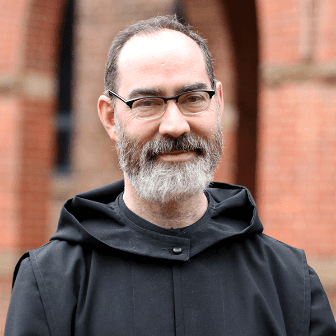
BROTHER BEDE
Born in New York, I moved to Georgia with my family after graduating high school and spending a semester in college. In Georgia I worked various jobs and eventually earned an English Education degree. For five years prior to entering the monastery I worked as a high school English teacher in North Georgia. I believed I was called to that secular vocation. But God, in fact, was calling me to another path, a path oriented in serving Him more directly in religious life. From the moment I crossed the threshold of Belmont, I knew God was calling me here. For it was here where I felt welcomed; it was here where I felt like a true member of the community, an integral part of the sacred tradition, and it was here, perhaps for the first time in my life, I felt that ineffable peace that God promises and that the world cannot give. In my previous walks of life prior to entering the abbey, I constantly felt the distractions of the world weighing down on me, incessantly drawing me away from God, even in my most devout moments. Here at the abbey, though, divine peace drives the world’s distractions away. This divine peace is the proximity of God. It is a beauty rooted first in the constant presence of the Eucharist and daily Mass, but flowers forth from each day praying the Divine Office and Lectio Divina. The journey to God truly begins in the silence and stillness of these prayers, where we in joy sing with the psalmist, “Happy are they who find refuge in you, whose hearts are set on pilgrim roads,” (Ps 84:6).
X
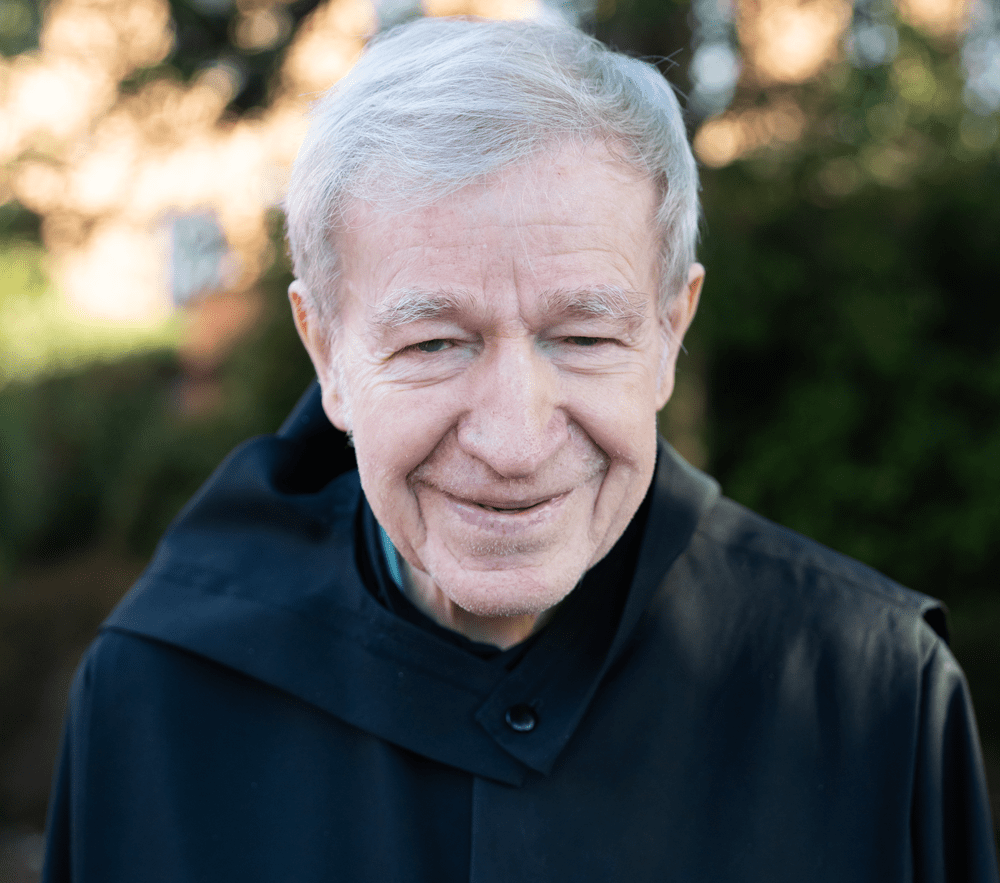
BROTHER EMMANUEL
Brother Emmanuel hails from New York and discovered his vocation later in life. At 15 he showed interest in religious life but began a journey in secular life eventually becoming a police officer. Many years later, in a conversation with his parish priest, he shared the leading he was getting from God to pursue the monastic life, his priest responded that “maybe God isn’t calling you to that kind of life.” But he could not refuse the promptings of the Holy Spirit. By chance, he discovered Belmont Abbey and decided to make a visit. The visit was all he needed to confirm the call he was hearing. He became fully professed at the age of 50 and now has been a monk at the Abbey for 30 years.
Brother Emmanuel is a soft-spoken man who says that life as a monk is different, but “we are all just humans too, but as long as you have your love for Jesus, no matter how complicated the path, he will lead you to your vocation.” Brother Emmanuel loves basketball, and you can often find him cheering the Crusaders on at our home games and taking part in the time-out discussions on the bench.
BROTHER CHRYSOSTOM
ABBOT PLACID
FATHER CHRISTOPHER
FATHER ELIAS
BROTHER PAUL
BROTHER EDWARD
BROTHER TOBIAH
FATHER DAVID BROWN
FATHER JAMES
BROTHER LEO
BROTHER BEDE
BROTHER EMMANUEL


Ready to Start Discerning?
If you believe you are called to join our monks at
Belmont Abbey, we are here to help you discern.